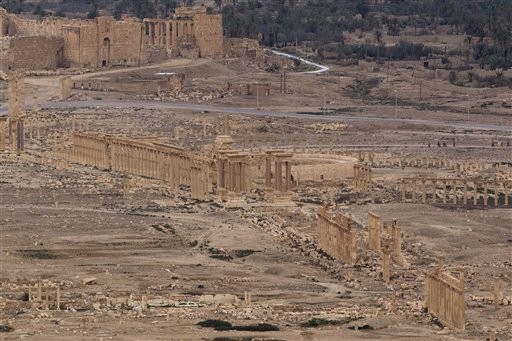Popular Reads
Top Results
Can't find what you're looking for?
View all search resultsPopular Reads
Top Results
Can't find what you're looking for?
View all search resultsUS grapples with renewed show of force by IS in Syria, Iraq
he Obama administration grappled with a renewed show of force by Islamic State militants on Wednesday as they advanced again toward the ancient Syrian crossroads of Palmyra and exposed the Iraqi capital's frailty through a series of deadly car bomb attacks.
Change text size
Gift Premium Articles
to Anyone
 A general view shows the ancient city of Palmyra in the central city of Homs, Syria, April 14, 2016. Russian combat engineers arrived in Syria on a mission to clear mines in Palmyra, which has been recaptured from Islamic State militants in an offensive that has proven Russia’s military might in Syria despite a drawdown of its warplanes. (AP/Hassan Ammar)
A general view shows the ancient city of Palmyra in the central city of Homs, Syria, April 14, 2016. Russian combat engineers arrived in Syria on a mission to clear mines in Palmyra, which has been recaptured from Islamic State militants in an offensive that has proven Russia’s military might in Syria despite a drawdown of its warplanes. (AP/Hassan Ammar)
T
he Obama administration grappled with a renewed show of force by Islamic State militants on Wednesday as they advanced again toward the ancient Syrian crossroads of Palmyra and exposed the Iraqi capital's frailty through a series of deadly car bomb attacks.
American officials said the US wasn't shifting its strategy for defeating the extremist group in either country. But the violence across the two central IS battlefields illustrated how the US-led campaign remains dependent on weak allies and even sometimes local leaders and forces that Washington opposes.
The developments overseas contrasted with more positive news at home, as FBI Director James Comey declared that fewer Americans were now traveling to enlist with IS as its brand suffers in the United States.
Whereas a couple of years ago investigators saw six to 10 Americans heading to the Mideast each month to join the fight, Comey said that number has averaged about one a month since last summer.
"There's no doubt that something has happened that is lasting," he told reporters. But agents are still evaluating more than 1,000 cases to gauge levels of radicalization and potential for violence. The threat remains high after the Islamic State-inspired attack in San Bernandino, California, in December that killed 14 people.
In the broader war against IS, the most complicated situation is in Syria.
There, the US hopes President Bashar Assad and his Russian backers can hold off a fresh offensive near Palmyra several weeks after they pushed IS out of its world-famous ruins and neighboring city. The militants on Wednesday seized a key rocket-launching site about 40 miles away, according to media reports and activists, effectively isolating government forces in Palmyra from supply routes elsewhere in the country.
"We certainly do not want to see ISIL expand the territory that they control and we certainly do not want to see ISIL put at risk once again such a historically and culturally significant city," White House spokesman Josh Earnest told reporters.
But Earnest said the US wouldn't coordinate defense efforts with Assad's military or Russia in the event the city faces another capitulation.
That leaves few other options for any intervention that might be deemed necessary. The US has a small contingent of special forces in Syria, but on the ground it primarily depends on Arab and Kurdish forces, several of which see Assad as a greater enemy than Islamic State militants.
Beyond its relics, Palmyra is important because of its location between the IS stronghold to the north and the capital of Damascus in the south. Losing the city again would thus provide IS a major logistical gain and propaganda coup.
And it would add further evidence of the militants' surprising capacity to inflict losses on its enemies, after killing a US Navy SEAL last week in Iraq. The special warfare operator, Charles Keating IV, was part of a quick reaction force that moved in to rescue U.S. military advisers from a firefight started by about 100 Islamic State fighters about 14 miles north of Mosul.
In Iraq, the US strategic thinking is more straightforward. The United States is backing Prime Minister Haider al-Abadi's attempt to break months of political deadlock through government reforms and a Cabinet reshuffle.
But three separate car bombings in the capital on Wednesday, killing more than 90 people and wounding at least 160, highlighted how weak his government's control over security remains. IS claimed responsibility for all three attacks, claiming they targeted Shiite militiamen; it was the deadliest day in Baghdad this year.
Earnest condemned the bombings, calling them "abominable." But he said al-Abadi was determined to protect his people, and unite Iraq's different factions against their common foe, and the US would help.
"This is a problem that the Iraqi people are going to have to solve when it comes to addressing the challenges in their own country," he said. "We've tried the path of the United States trying to impose a solution on these countries that are facing so much turmoil and violence.
"That didn't work out very well. It didn't work out very well for the United States. It didn't work out very well for the Iraqi people either. So we need to pursue a strategy where we are empowering the Iraqi government, the Iraqi security forces and the Iraqi people to confront successfully the problems that are plaguing their own nation. (bbn)









